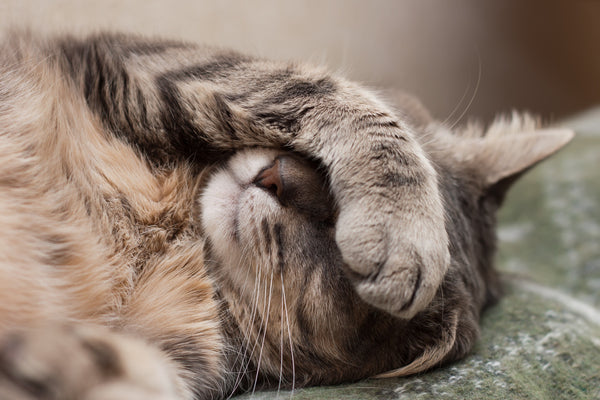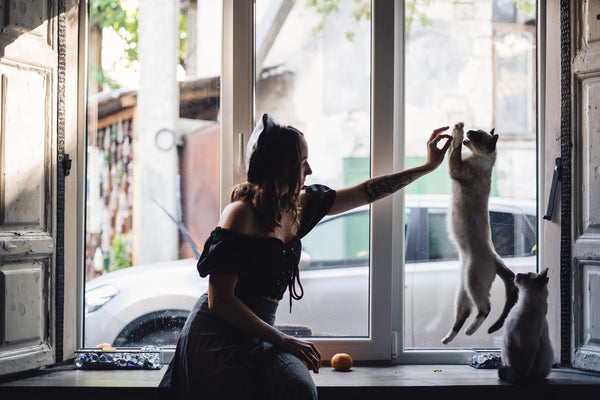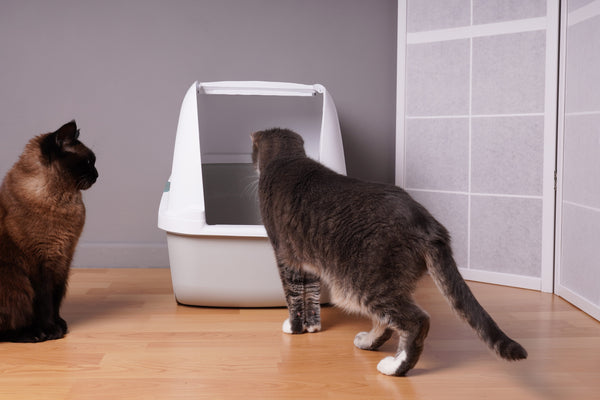As much as we love our feline friends, let's face it - they can be quite the picky eaters. But what happens when their finicky eating habits lead to cat constipation? As pet owners, it's important to understand the symptoms, causes, and treatment of constipation in our cats.
In this article, we will take a deep dive into this common issue and provide some helpful tips on how to relieve your cat's constipation and discomfort.
Understanding Constipation in Cats
Constipation is a common problem faced by cats and can be a cause of concern for cat owners. It occurs when there is difficulty passing stool or when the frequency of bowel movements decreases significantly.
While occasional constipation may not be a major issue, chronic constipation can lead to serious health problems in cats.
What is constipation?
First things, first. What is constipation? Maybe you've heard the word being used around a lot but do not quite understand the process that is taking place behind the scenes.
Constipation is a condition where feces become dry and hard, making it difficult for your cat to pass stool. This can be caused by various factors, such as dehydration, lack of fiber in the diet, or even underlying medical conditions.
So what are normal bowel movements?
As a cat owner, it is important to keep track of your feline's bowel movements. The average bowel movement frequency for cats is about once or twice a day. However, this may vary depending on factors such as age, diet, and activity levels.

Cat Constipation Symptoms
It can be tricky to tell if your cat is constipated, especially since they are masters at hiding any signs or other symptoms of discomfort.
However, there are some common symptoms to watch out for, including:
- Straining and struggling in the litter box
- Small or infrequent bowel movements
- Hard and dry stools
- Loss of appetite
- Lethargy and discomfort
If your cat is experiencing any of these symptoms, it is best to consult with a veterinarian for proper diagnosis and medical treatment.
Why Is My Cat Constipated?
Diet and Nutrition
The biggest causes of cat constipation can often lead back to diet, in particular fiber intake. Fiber plays an important role in aiding digestion and promoting regular bowel movements. If your cat's diet lacks fiber, it can lead to a constipated feline.
To make matters worse - cats are not big fans of drinking water, which puts them at a higher risk of dehydration. When there is not enough fluid in the body, the stool becomes dry and hard, making it difficult to pass.
Additionally, just like humans, obesity can lead to a myriad of health problems in cats, one being constipation. This is because the extra weight puts pressure on the organs and can slow down digestion.
Medical Conditions
In some cases, constipation may be caused by an obstruction in the intestinal tract. This is often seen in cats who have ingested either foreign objects or excessive hair.
On the other hand, conditions such as spinal cord injuries or nerve damage can also cause constipation in cats. Moreover, conditions like megacolon, where the colon becomes enlarged and loses its ability to contract, can also lead to constipation in cats.
On top of that, some medications can have constipation as a side effect, particularly those that affect the nervous system or muscles.
Risk Factors
Age and Breed Predisposition
As their metabolism and digestive system slow down, elderly cats experience constipation. This is because aging causes the muscles in the colon to weaken, making it harder for the cat to push out stool.
Certain breeds, such as Persians and Himalayans, are more prone to constipation due to their long fur and tendency to groom themselves excessively. This often leads to hairballs that can cause intestinal blockages.
But fear not - PetHonesty has your back with our hairball supplements!

Sedentary Lifestyle
Regular exercise helps in promoting proper digestion and maintaining regular bowel movements. Cats who are primarily indoors or have a sedentary lifestyle may be at a higher risk of constipation. Outdoor cats tend to have more physical activity compared to indoor cats, which can contribute to better digestion and regular bowel movements.
Stress and Anxiety
Cats are sensitive creatures and can be easily stressed or anxious. Changes in their environment, such as moving homes or the addition of a new pet, can lead to constipation because stress can disrupt the normal functioning of the digestive system.
In addition to stressors, any changes in routine or environment can also lead to constipation in cats. This includes changes in lifestyle and diet changes, litter box location, and even the type of litter used.
Prevention of Constipation in Cats
Diet and Nutrition Tips
High-Fiber Diet
A high-fiber diet is essential for promoting regular bowel movements in cats. This can be achieved through commercial cat food or by adding fiber-rich foods (such as canned pumpkin or psyllium) to their diet.
Proper Hydration
Encouraging your cat to drink more water can also help prevent constipation. Consider using a cat fountain or adding wet food to their diet, as it contains more moisture compared to dry food.
Supplements
Supplements can also be a helpful addition to your cat's diet, particularly those containing probiotics or digestive enzymes. These can help promote normal movement of food and prevent constipation.
Avoiding Table Scraps
Some human foods, such as dairy products and fatty meats, can cause constipation in cats. It is important to avoid giving your cat table scraps and instead stick to a balanced diet that has been recommended by your veterinarian.

Environmental Modifications
Providing Multiple Litter Boxes
Having multiple litter boxes in different locations can encourage your cat to use the bathroom more frequently, preventing constipation. It also helps to keep the litter box clean and free of any obstacles.
Encouraging Physical Activity
Regular exercise is not only beneficial for maintaining a healthy weight but also helps promote regular bowel movements. Consider playing with your cat by using interactive toys or providing them with an outdoor enclosure to explore and play in.
Creating a Stress-Free Environment
Reducing stressors in your cat's environment can also help prevent constipation. This includes providing a comfortable and safe space for them and keeping their routine consistent.
Veterinary Care
Prescription Medication
If your cat is experiencing severe constipation, your veterinarian may prescribe medication to help stimulate bowel movements. These medications should only be given under the guidance of a veterinarian.
Routine Checkups
Regular checkups with your veterinarian are important for maintaining your cat's overall health and catching any potential issues, including constipation, early on.
Enemas or Manual Extraction
In severe cases of constipation, enemas or manual extraction may be necessary to remove impacted stool from the colon. These procedures should only be performed by a veterinarian.
Surgery
In rare cases, surgery may be necessary to treat any underlying medical conditions or chronic diseases that are causing constipation in cats.
Treatment Options
Mild Constipation
In mild cases of constipation, changes in diet and lifestyle may be enough to relieve symptoms. Encouraging exercise, providing a high-fiber diet, and ensuring proper hydration can all help promote regular bowel movements.
Severe Constipation
If constipation persists or becomes severe, it is important to seek veterinary care. Your veterinarian may prescribe medication to relieve constipation or use enemas or manual extraction in severe cases.

FAQs
What are the symptoms of constipation in cats?
Symptoms of constipation in cats include straining or difficulty during bowel movements, passing small or hard stools, decreased appetite, and lethargy.
How can I tell if my cat is constipated?
If your cat is experiencing any of the symptoms mentioned above, it is important to consult with a veterinarian for a proper diagnosis and treatment plan.
Are there any home remedies for constipation in cats?
While changes in diet and lifestyle and at-home remedies can help prevent or relieve mild cases of constipation, it is important to seek professional veterinary care for severe cases. Home remedies should only be used after first consulting with a veterinarian.
Can supplements be used as a remedy for constipation in cats?
Supplements containing probiotics or digestive enzymes can be used as a remedy for constipation in cats but should only be given under the guidance of a veterinarian. It is important to always follow dosage instructions and monitor your cat's response to the supplement.
How often should I clean my cat's litter box?
Ideally, you should scoop the litter box at least once a day and completely clean it out every week. Having multiple litter boxes can also help prevent constipation in cats.
Conclusion
Constipation is a common and uncomfortable condition that can affect cats of all ages and breeds. By understanding the symptoms, causes, and treatment options, you can take preventative measures that will help your constipated cat.
Remember to always consult with a veterinarian for proper diagnosis and treatment if your cat is experiencing constipation. By following the tips and advice described in this article, you can help prevent any cat constipation symptoms and keep your cat's digestive health in tip-top shape.













